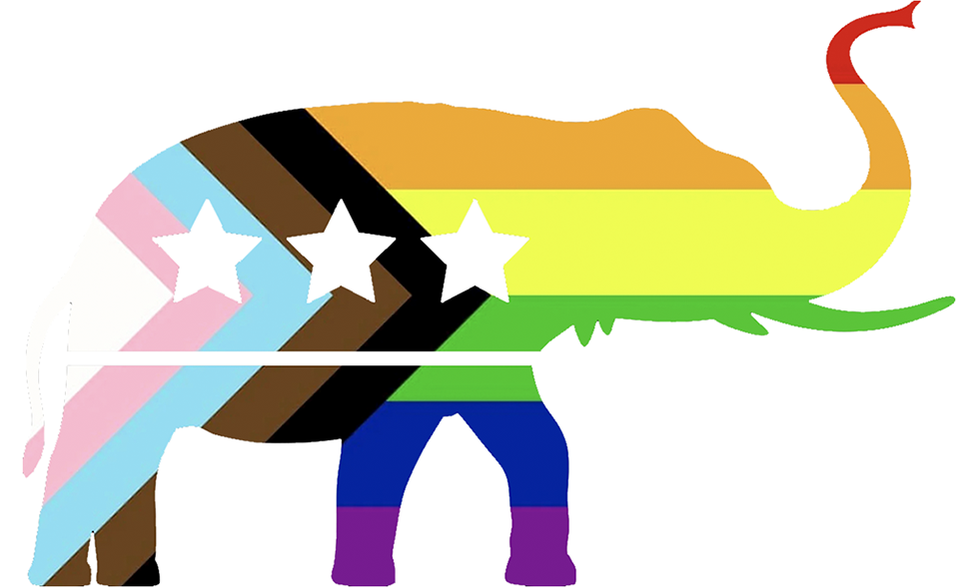WINTER ISSUE 2024:
December 1, 2024
Rise of the Queer Republican
An odd paradox considering the GOP’s embrace of anti-LGBTQ+ rhetoric and legislation
By William Cameron
USE ARROWS TO MOVE THROUGH IMAGES
In recent years, the American political landscape has witnessed a curious and controversial phenomenon: the rise of queer Republicans. For many, this development raises perplexing questions about identity, ideology, and self-interest. How do individuals from a community that has historically been marginalized by conservative policies come to align themselves with a party that often opposes their rights? The rise of queer Republicans forces a reckoning with the complex intersections of identity and politics in America.
Organizations like the Log Cabin Republicans, which advocate for LGBTQ+ inclusion within the GOP, have gained renewed visibility and influence. High-profile figures such as Caitlyn Jenner, former Trump administration official Richard Grenell, and commentators like Christian Walker have openly embraced both their LGBTQ+ identity and Republican values. This growing movement reflects a desire among some queer Americans to challenge the notion that sexual orientation or gender identity dictates political allegiance.
For these individuals, their conservative beliefs often revolve around issues like economic freedom, limited government, and national security. They argue that these principles should transcend identity politics and that the Republican Party, with its emphasis on individual liberty, can be a natural home for those values.


Images by William Cameron
However, the rise of queer Republicans has sparked intense debate, particularly within the LGBTQ+ community. Critics argue that aligning with the Republican Party is akin to voting against one’s own interests, given the GOP’s historical and ongoing opposition to LGBTQ+ rights. From resisting marriage equality to supporting legislation that curtails transgender rights, the Republican Party’s track record on LGBTQ+ issues are fraught with policies that many see as harmful to queer Americans.
The paradox becomes even more stark when considering the GOP’s embrace of anti-LGBTQ+ rhetoric and legislation in recent years. Laws that restrict transgender athletes from competing in sports, bills that limit discussions of LGBTQ+ topics in schools, and the party’s general opposition to expanding civil rights protections for LGBTQ+ individuals all underscore the disconnect between queer Republicans and the broader community’s interests.
So why do some LGBTQ+ individuals align themselves with a party that many perceive as antithetical to their well-being? For some, the answer lies in a belief that identity should not be the sole determinant of political affiliation. These queer Republicans argue that issues like fiscal conservatism, gun rights, and immigration policy matter just as much, if not more, than LGBTQ+ rights. They contend that by participating in the GOP, they can influence the party from within and push for more inclusive policies.


Pin Images by Redbubble
Yet this strategy is not without its costs. By aligning with a party that frequently undermines LGBTQ+ rights, queer Republicans risk alienating themselves from the broader LGBTQ+ community. Many LGBTQ+ activists view this alignment as a betrayal, arguing that it undermines the collective struggle for equality and justice. The tension between individual political beliefs and the broader interests of the LGBTQ+ community highlights the complexity of identity politics in America.
The rise of queer Republicans raises important questions about the future of political identity in America. As the lines between ideology and identity become increasingly blurred, the traditional assumptions about voting behavior are being challenged. For the LGBTQ+ community, the presence of queer Republicans forces a difficult conversation about what it means to act in one’s own best interests and how to balance personal beliefs with collective needs.
In the end, the rise of queer Republicans reflects the broader polarization and complexity of American politics. It serves as a reminder that political identities are not monolithic and that the relationship between identity and ideology is far from straightforward. As the nation continues to grapple with these issues, the debate over queer Republicans will likely remain a contentious and thought-provoking aspect of the political discourse.
----
M
About the author
With a 24-year background in print advertising sales and publishing, a love for art and design, and steadfast determination, William has helped develop and execute the successful launch of three publications over his career; METROMODE being his own. As the Creative Director, he sets the brand's vision and leads a talented team of writers while bringing his creative abilities (16-years in graphic design) to designing each issue.
Since 2004, METROMODE has been a beacon for the LGBTQIA+ community and our allies. We’re a publication built on quality, not only in our advertising clients but in the look, feel, and editorial pieces of each magazine. METROMODE speaks to the entire community with thoughtful analysis of local, national, and global events affecting our community; developments in business, finance, the economy, and real estate; interviews with emerging and seasoned artists, musicians, and writers; appealing new opportunities to enjoy Colorado’s rich culture and social atmosphere; quality aesthetic experiences from film, to food, to music, to art, to night life; and challenging social and political thought.
MORE FROM METROMODE
CONNECT WITH US




© 2024-2025 METROMODE magazine. All rights reserved. Use of this site constitutes acceptance of our User Agreement and Privacy Policy and Cookie Statement. METROMODE magazine may earn a portion of sales from products that are purchased through our site as part of our Affiliate Partnerships with retailers. The material on this site may not be reproduced, distributed, transmitted, cached or otherwise used, except with the prior written permission of Metromode magazine.


